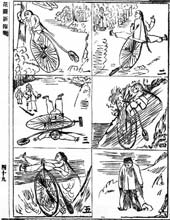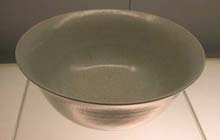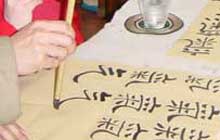Dynasty
Period
Characteristics
Xia & Shang
2200 – 1100 BC
Mythological period
* Eulogized agricultural society with attendant mythology
* Evidence of early divination techniques
Zhou
1100 – 221 BC
Birth of Chinese philosophy
* Seven socially and politically developed states compete for supremacy.
* Birth of Confucianism, Daoism and competing ideologies of the "hundred schools".
Qin
221 – 207 BC
War
* Infamous & » Read more »
» Read more »(Imperial Tours is grateful to Amir for permission to publish this excerpt from his Phd research. )
China -today the nation with the largest fleet of bicycles in the world- is surprisingly underrepresented in cycle history: we know nearly nothing about Chinese cycle history, cycle production, cycling habits or other aspects of the bicycle in China.
This contribution presents first results from historical Chinese sources, which were collected for my doctoral thesis, » Read more »
» Read more »cloisonné
snuff bottles
lacquerware
jade
seal carvings
silk
carpets
kites
After reviewing the craft subjects below, enjoy photos of crafts products in our Shopping Showroom .
Cloisonné
Since 1904 when a Chinese cloisonné vessel won first prize at the Chicago World Fair, » Read more »
» Read more »The history of Chinese ceramics began some eight thousand years ago with the crafting of hand-molded earthenware vessels. Soon after, in the late neolithic period, the potter's wheel was invented facilitating the production of more uniform vessels. The sophistication of these early Chinese potters is best exemplified by the legion of terracotta warriors found in the tomb of Emperor Qin (r. 221-206 BC).
Over the following centuries innumerable new ceramic technologies and styles were developed. » Read more »
» Read more »According to ancient lore, when a Chinese man named Cangjie learned the divine secret of writing, the spirits were so angry that millet rained from heaven.
Perhaps this was because one of the first applications of the Chinese pictograph system was in the practice of divination. This long-standing association between pictographs and the occultforces of nature helps explain the historic and continuing importance the Chinese people attach to writing and to the art of calligraphy. » Read more »
» Read more »

